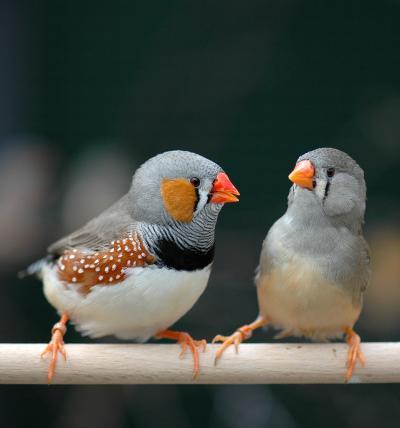Yet female birds are just as promiscuous as males and researchers from the Max Planck Institute for Ornithology in Seewiesen set out to investigate why. In a genetic long-term study of zebra finches they found that females inherit the disposition for their infidelity from their fathers.
So men get the blame even when females sleep around?
The common thinking that most bird species lead a monogamous way of life was dispelled when scientists used molecular genetic methods over the past 20 years and found that many juveniles do not originate from their social fathers. Initially, the explanation for these extra-pair paternities seemed plausible; the males could enhance their reproductive success through a higher number of offspring and females received high quality genes when they were keeping an eye out for attractive mates.
Recently, scientists have cast doubt on this explanation as the actual benefits for the females were not as high as expected by theory. To the contrary, the negative aspects even prevailed. The cuckolded males often reduce their parental effort and also support from extra-pair mates cannot be expected because they rather help their own mate. Therefore the question remained as to why some females actively seek other males for extra-pair matings.
Behavioral ecologist(!) Wolfgang Forstmeier and colleagues at the Max Planck Institute for Ornithology in Seewiesen say they have now found a possible explanation for this phenomenon.
For eight years they investigated the sexual behavior of over 1500 zebra finches, first by subkecting unmated male and female birds to a test of their sexual motivation or libido. Afterwards a subset of the finches was transferred into aviaries in order to test how socially monogamously mated individuals behaved to each other within a large group. Using a video surveillance system the researchers could observe how mated females were reacting to advances of their own partner and of stranger males. In addition, the researchers conducted genetic paternity analysis by using a micro-satellite marker method in order to determine the number of offspring that a male had sired in a foreign nest. They also identified the number of offspring that a female produced together with an extra-pair male.

How you doin'?
Apparently the readiness of females to engage in extra-pair contacts was inherited from their fathers that had been cheating on their partners as well. They claim the predisposition for infidelity shows a moderate, but evolutionarily crucial, genetic basis. Since the readiness for infidelity is passed on from the fathers to the daughters the researchers arrived at a new interpretation of female infidelity.
"It is not essential that there is an evolutionary benefit for the females", says Wolfgang Forstmeier, author of the study. "It is rather sufficient that the male ancestors had benefits that resulted from their promiscuity. A "Casanova-gene" will increase its frequency within a population as long as the benefits to the male gene carriers outweigh the costs for the female gene carriers".
Whether the hypothesis of a correlated evolution of male and female infidelity can be transferred to humans is for the future, though look for an evolutionary psychologist to survey some college students and have a paper out by next week.
"The question to what extent it is the same genes that influence female and male behaviour in a similar way has to be answered in follow-up studies," says Forstmeier.





Comments